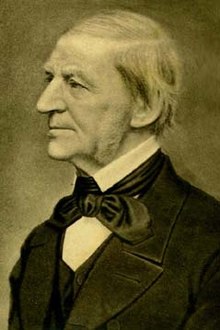Literature of New England
This article needs additional citations for verification. (June 2014) |
| This article is part of a series on the |
| Culture of the United States |
|---|
 |
| Society |
| Arts and literature |
| Other |
| Symbols |
|
United States portal |

The literature of New England has had an enduring influence on American literature in general, with themes such as religion, race, the individual versus society, social repression, and nature, emblematic of the larger concerns of American letters.[1]
History
New England's rich literary history begins with the oral tradition of Native American tribes. During the colonial period, Stephen Daye set up the first British-American printing press in Cambridge, Massachusetts, and, in 1640, published the Bay Psalm Book as the first book printed in British North America. England-born Anne Bradstreet, who had settled in Massachusetts Bay Colony, there composed what was soon published as The Tenth Muse Lately Sprung Up in America.
New England was the birthplace of many American
Washington Irving wrote short stories set in New England communities of dutch origin. Emily Dickinson lived most of her life in Amherst, Massachusetts. Henry Wadsworth Longfellow was from Portland, Maine, and Edgar Allan Poe was born in Boston.
According to some, the famed
Poets
The region has also drawn authors and poets from other parts of the U.S. Mark Twain thought Hartford was the most beautiful city in the U.S.[citation needed] He made it his home, and wrote his masterpieces there. He lived next door to Harriet Beecher Stowe, a local most famous for the novel Uncle Tom's Cabin. John Updike, originally from Pennsylvania, eventually moved to Ipswich, Massachusetts, which served as the model for the fictional New England town of Tarbox in his 1968 novel Couples. Robert Frost was born in California, but moved to Massachusetts during his teen years and published his first poem in Lawrence; his frequent use of New England settings and themes ensured that he would be associated with the region. Arthur Miller, a New York City native, used New England as the setting for some of his works, most notably The Crucible.

More recently,
Largely on the strength of its local writers, Boston was for some years the center of the U.S. publishing industry, before being overtaken by New York in the middle of the nineteenth century. Boston remains the home of legacy publishers
See also
References
- ^ "New England". Salon.com. Retrieved 2010-01-18.
